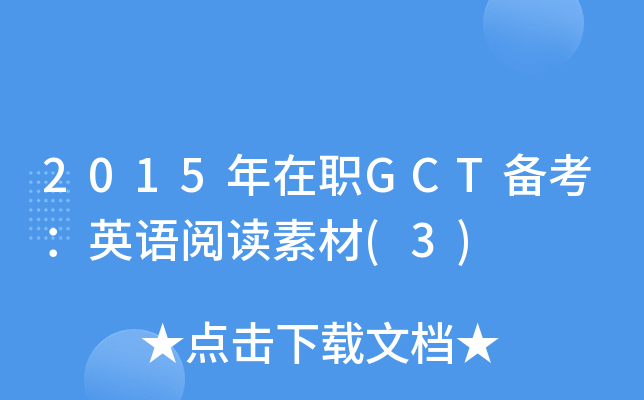2015ДкФЪВҡGCTӮдҝјЈәУўХZ(yЁі)йҶЧxЛШІД(3)
•r(shЁӘ)йgЈә2015-08-18 18:03:00 Ғн(lЁўi)ФҙЈәҹo(wЁІ)‘nҝјҫW(wЁЈng) [ЧЦуwЈәРЎ ЦР ҙу]ЎЎЎЎThe central bank needs to tread carefully amid signs that its earlier policy easing has fanned property price rises that have triggered public anxiety.
ЎЎЎЎThat's probably why the PBOC has so far defied expectations for more aggressive moves since its last interest rate cut in July. Instead, it is opting to use reverse repos to inject short-term money into the banking system.
ЎЎЎЎHousing prices, rebounded on a monthly basis for the second straight months in July, following eight consecutive months of declines, while annual inflation accelerated to 2 percent in August from a 30-month low of 1.8 percent in July.
ЎЎЎЎ"The key dilemma for policymakers is that inflation looks like it will pick up earlier than expected, while a growth recovery coming later than expected," said Yiping Huang, chief economist for emerging Asia at Barclays Capital in Hong Kong.
ЎЎЎЎ"I think the central bank will probably do a little bit more (on easing), depending on how the economy is doing. Realistically, the economy is going to rebound but certainly not going to rebound significantly."
ЎЎЎЎThe PBOC may keep policy settings unchanged until the fourth quarter, when growth may stabilize or even recover due to the lagging impact of policy stimulus, according to government economist familiar with the policy-making process.
ЎЎЎЎ"We don't expect any major changes in macro-economic policy in the run up to the 18th Party Congress and the fundamental tone for monetary policy remains prudent," Wang Jun, senior economist at the China Centre for International Economic Exchanges (CCIEE), a Beijing-based think-tank, told Reuters.
ЎЎЎЎ"Policymakers have drawn a lesson from the past and don't want to stimulate economic growth aggressively," he said, referring to concerns that too much stimulus could re-ignite inflationary pressures.
ЎЎЎЎThe 18th Communist Party Congress, at which China's next top leaders are likely to be unveiled, is set for October.
ЎЎЎЎUnder the banner of policy 'fine-tuning", the central bank cut interest rates twice in June and July and lowered banks' reserve requirement ratio (RRR) three times since late 2011, freeing an estimated 1.2 trillion yuan for boosting loans.
ЎЎЎЎ"The chances of policy easing are slim in the near term, but we cannot rule out a cut in RRR or interest rates," said You Hongye, an economist at China Essence Securities in Beijing.
ЎЎЎЎЦРОД·ӯЧgЈә
ЎЎЎЎІ»Цшјұ
ЎЎЎЎ·ЦОцҺҹұнКҫ,Ц»ТӘҫНҳI(yЁЁ)КРҲц(chЁЈng)ұЈіЦ·Җ(wЁ§n)¶Ё,ұұҫ©*ҫНІ»•ю(huЁ¬)М«“ъ(dЁЎn)РДҪӣ(jЁ©ng)қъ(jЁ¬)іЙйL(zhЁЈng)·ЕҫҸ.
ЎЎЎЎЛДДкЗ°И«ЗтЩQ(mЁӨo)ТЧҪУҪьНЈңю,”ө(shЁҙ)ФВғИ(nЁЁi)Ҫь2,000Иf(wЁӨn)ЦРҮш(guЁ®)ИЛК§ҳI(yЁЁ),лSббЦРҮш(guЁ®)НЖіцҙуТҺ(guЁ©)ДЈҙМјӨУӢ(jЁ¬)„қ.
ЎЎЎЎө«Я@ҙОҫНҳI(yЁЁ)КРҲц(chЁЈng)ёьҫЯнgРФ.·ЦОцҺҹЦёіц,·ю„Х(wЁҙ)ҳI(yЁЁ)”U(kuЁ°)ҸҲ,ҪөөНБЛҪӣ(jЁ©ng)қъ(jЁ¬)іЙйL(zhЁЈng)ҢҰ(duЁ¬)ҙаИхөДіцҝЪРРҳI(yЁЁ)өДТАЩҮ,Іў„“(chuЁӨng)ФмБЛҙуБҝҫНҳI(yЁЁ).
ЎЎЎЎлmИ»ҢҰ(duЁ¬)ИЛРРІЙИЎРР„У(dЁ°ng)өДоA(yЁҙ)ЖЪҪөңШ,ө«Н¶ЩYХЯЮD(zhuЁЈn)¶шкP(guЁЎn)ЧўЦРҮш(guЁ®)ҝЙДЬіцЕ_(tЁўi)ёь¶аШ”(cЁўi)ХюҙМјӨҙлК©.Хюё®¬F(xiЁӨn)ТСјУҫoңК(zhЁіn)ӮдШ”(cЁўi)ХюҙМјӨКЦ¶О.
ЎЎЎЎ°l(fЁЎ)ёДОҜЙПЦЬРыІј,ТСЕъңК(zhЁіn)»щҪЁн—(xiЁӨng)ДҝөДТҺ(guЁ©)ДЈі¬Я^(guЁ°)1,500ғ|ГАФӘ.ө«·ЦОцҺҹИФ‘СТЙЯ@І»•ю(huЁ¬)ҪoҪӣ(jЁ©ng)қъ(jЁ¬)іЙйL(zhЁЈng)Һ§Ғн(lЁўi)ИОәОБўёНТҠУ°өДР§№ы,Тт?yЁӨn)йЯ@Р©н—(xiЁӨng)ДҝИФРиТӘ•r(shЁӘ)йgҒн(lЁўi)»IјҜЩYҪрәНй_КјҪЁФO(shЁЁ).
ЎЎЎЎҮш(guЁ®)„Х(wЁҙ)ФәҝӮАнңШјТҢҡЦЬ¶юұнКҫ,Хюё®өҪ7ФВөЧКХЦ§ПаөЦЯҖУР1Иf(wЁӨn)ғ|ФӘУао~,ҡvДкҪY(jiЁҰ)УаөДЯҖУР1З§¶ағ|ФӘ·Җ(wЁ§n)¶ЁХ{(diЁӨo)№қ(jiЁҰ)»щҪр.
ЎЎЎЎңШјТҢҡЯҖұнКҫ,ЦРҮш(guЁ®)Ҫӣ(jЁ©ng)қъ(jЁ¬)ФцЛЩИФИ»ұЈіЦФЪДкіхоA(yЁҙ)¶ЁөД7.5%ДҝҳЛ(biЁЎo)…^(qЁұ)йgЦ®ғИ(nЁЁi).
ЎЎЎЎЛыЯҖұнКҫ,ҪсДкЗ°ЖЯӮҖ(gЁЁ)ФВРВ„“(chuЁӨng)ФмҫНҳI(yЁЁ)ҚҸО»810Иf(wЁӨn)ӮҖ(gЁЁ),Э^ЙПДкН¬ЖЪФцјУ5%.Я@ӮҖ(gЁЁ)”ө(shЁҙ)ЧЦКЗХюё®ДкіхЛщФO(shЁЁ)900Иf(wЁӨn)ДҝҳЛ(biЁЎo)өД90%.
ЎЎЎЎ"®”(dЁЎng)З°ЛыӮғХжөДІ»Цшјұ(·ЕҢ’ХюІЯ).ЛыӮғ•r(shЁӘ)ҝМЧцәГңК(zhЁіn)Ӯд,Из№ыЗйӣrҗә»Ҝ,ЛыӮғ•ю(huЁ¬)Чціцн‘‘Ә(yЁ©ng),"әЙМmҮш(guЁ®)лHјҜҲF(tuЁўn)ҒҶЦЮСРҫҝЦч№ЬTim CondonХf(shuЁӯ).
ЎЎЎЎ"Ҫӣ(jЁ©ng)қъ(jЁ¬)ұн¬F(xiЁӨn)І»КЗМ«әГ,ө«ТІӣ]УРДЗьNІо."
- 2025Дк№ӨіМҙTКҝҝјФҮ•r(shЁӘ)йgј°ҝЖДҝЈә2024Дк12ФВ
- 2025Дк№ӨіМҙTКҝҝјФҮҲу(bЁӨo)Гы•r(shЁӘ)йg№«Іј Ҳу(bЁӨo)ГыИлҝЪй_НЁ
- ұұҫ©2025Дк№ӨіМҙTКҝҝјФҮҲу(bЁӨo)Гы•r(shЁӘ)йg№«Іј Ҳу(bЁӨo)ГыИлҝЪй_
- 2025ДкЙҪ–|№ӨіМҙTКҝҝјФҮ•r(shЁӘ)йgј°ҝјФҮҝЖДҝЈә2024
- 2025ДкәЈДП№ӨіМҙTКҝҝјФҮ•r(shЁӘ)йgј°ҝјФҮҝЖДҝЈә2024
- 2025ДкОчІШ№ӨіМҙTКҝҝјФҮ•r(shЁӘ)йgј°ҝјФҮҝЖДҝЈә2024
- 2025Дкұұҫ©№ӨіМҙTКҝҝјФҮ•r(shЁӘ)йgј°ҝјФҮҝЖДҝЈә2024
- 2025ДкЛДҙЁ№ӨіМҙTКҝҝјФҮ•r(shЁӘ)йgј°ҝјФҮҝЖДҝЈә2024


